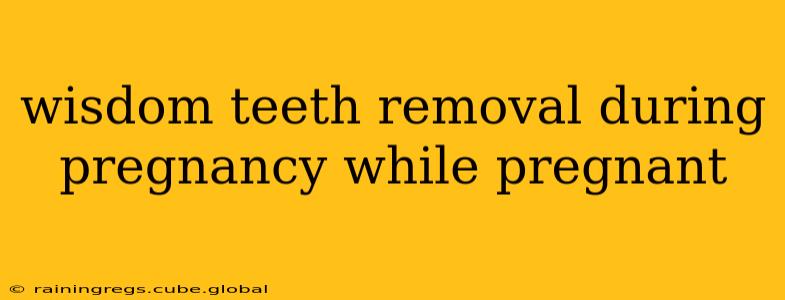The prospect of wisdom teeth removal while pregnant can be daunting. Navigating pregnancy already presents a myriad of considerations, and adding a surgical procedure to the mix understandably raises concerns. This comprehensive guide delves into the complexities of wisdom teeth extraction during pregnancy, outlining the risks, exploring recommendations from dental professionals, and presenting alternative solutions.
Is it Safe to Remove Wisdom Teeth While Pregnant?
This is the central question many pregnant women grappling with impacted wisdom teeth ask. The short answer is: it depends. The safety of wisdom teeth removal during pregnancy hinges on several factors, including the stage of pregnancy, the complexity of the extraction, and the overall health of both the mother and the developing fetus. Early pregnancy (first trimester) and late pregnancy (third trimester) generally present higher risks due to potential impacts on fetal development and increased vulnerability to complications. The second trimester is often considered the safest window for elective procedures like wisdom teeth removal, but this should always be discussed with both a dentist and an obstetrician.
What are the Risks of Wisdom Teeth Removal During Pregnancy?
Several risks are associated with wisdom teeth removal during pregnancy:
- Infection: The risk of infection following any surgical procedure is elevated, and pregnancy can further complicate this risk. Infections during pregnancy can potentially impact fetal development.
- Medication: Many medications used during and after wisdom teeth removal may not be suitable during pregnancy. The dentist will need to carefully select medications that pose minimal risk to the fetus.
- Anesthesia: While local anesthesia is typically used for wisdom teeth removal, the potential effects of anesthesia on the developing fetus must be carefully considered and discussed with medical professionals.
- Stress and Pain: The stress and pain associated with wisdom teeth removal can negatively impact the pregnant woman’s overall health and well-being.
- Bleeding: Increased bleeding during and after surgery is possible during pregnancy due to hormonal changes.
- Premature Labor: In rare cases, the stress of the procedure and potential complications could theoretically contribute to premature labor, although this is uncommon.
When is Wisdom Teeth Removal During Pregnancy Recommended?
Wisdom teeth removal during pregnancy is generally only recommended when there is a significant and urgent medical need. This could include:
- Severe pain and infection: Untreated infections can pose a considerable risk to both the mother and the fetus.
- Impacted teeth causing damage: If the wisdom teeth are causing damage to adjacent teeth or the jawbone, extraction may be necessary.
- Cysts or tumors: The presence of cysts or tumors associated with wisdom teeth requires prompt medical attention.
What are the Alternatives to Wisdom Teeth Removal During Pregnancy?
If the situation isn't urgent, delaying the extraction until after pregnancy is often the safest course of action. However, managing the discomfort and potential risks during pregnancy requires careful attention. Options include:
- Pain management: Over-the-counter pain relievers (approved by your doctor) and warm compresses can help manage discomfort.
- Regular dental checkups: Close monitoring by your dentist can help detect any complications early.
- Antibiotics: If an infection develops, antibiotics that are safe during pregnancy may be prescribed.
Can I get antibiotics for an infected wisdom tooth while pregnant?
Yes, but only under the strict guidance of your dentist and obstetrician. Certain antibiotics are safe during pregnancy, while others are not. Your medical team will need to assess the situation and prescribe the most appropriate and safest course of action. Self-medicating is dangerous during pregnancy, and always consult with your healthcare providers.
What should I do if I'm pregnant and have a wisdom tooth problem?
Immediate consultation with both your dentist and obstetrician is crucial. They will jointly assess your specific situation, considering the stage of your pregnancy, the severity of the problem, and your overall health. This collaborative approach will ensure the safest and most appropriate treatment plan is developed. Do not attempt to self-treat or delay seeking professional medical help.
Conclusion
The decision to remove wisdom teeth during pregnancy is a complex one that requires careful consideration of multiple factors. Prioritizing the health and well-being of both mother and baby is paramount. A collaborative approach involving a dentist and an obstetrician is essential to determine the best course of action, balancing the risks and benefits of treatment based on individual circumstances. Remember, delaying the procedure until after pregnancy is often the safest approach unless there's an urgent medical need.
